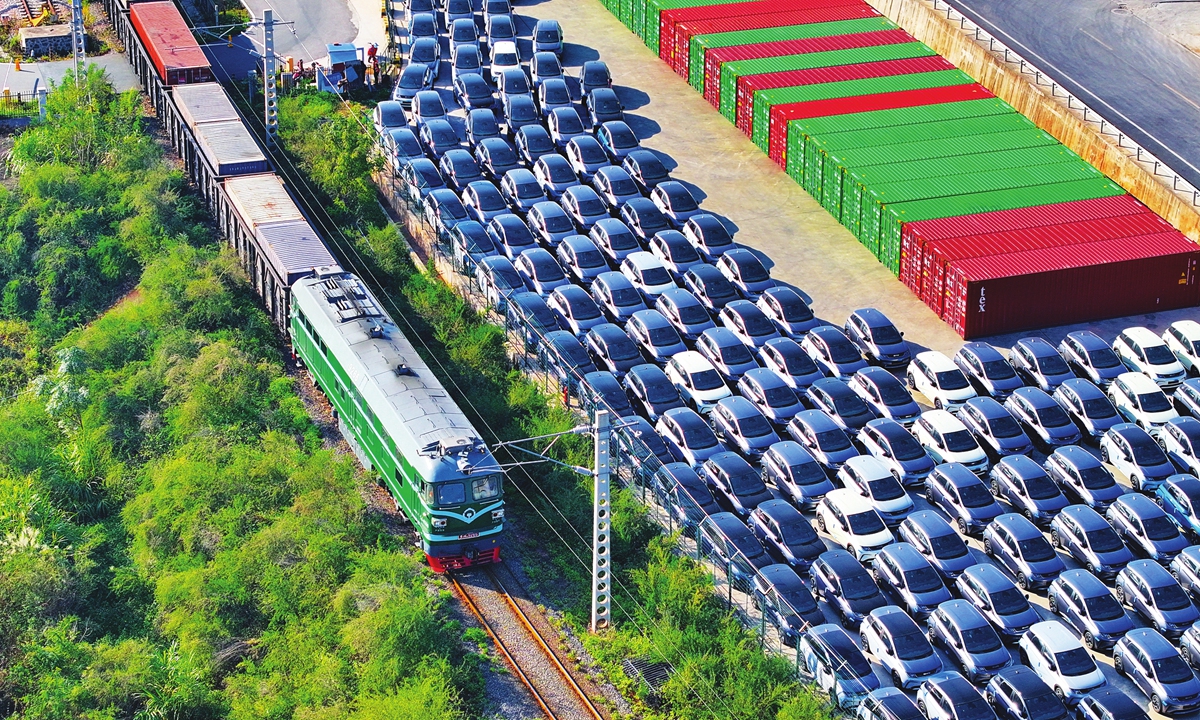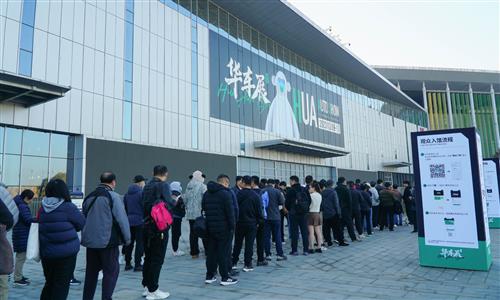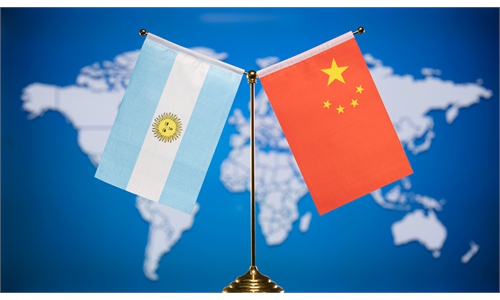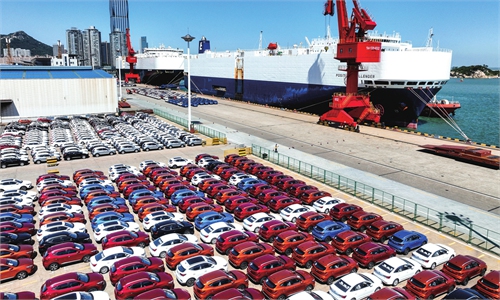Pulse on China's Economy: China's NEV sales continue to soar, injecting fresh momentum into high-quality growth
Leading industrial modernization through tech innovation: meeting

A freight train departs from Ganzhou International Inland Port, East China's Jiangxi Province on December 6, 2023, as a staging area of NEVs await shipment abroad. Photo:VCG
China's new-energy vehicle (NEV) sales have continued to surge throughout the year, with the momentum expected to continue into 2024. Aligned with a recent tone-setting key Party meeting, which emphasized the pivotal role of technology innovation in industrial modernization, experts on Monday highlighted the NEV sector as a representative leader in spearheading innovation and driving overall growth.
As a strategic emerging industry, the NEV sector has become a crucial engine for China's high-quality economic development. With policy support, it will continue to drive the advancement of cutting-edge technologies, accelerate industry collaboration, and unleash a multiplier effect in propelling economic growth, experts said.
The "penetration rate" of NEVs at retail - the proportion of NEV sales to the total vehicle sales - reached 40.4 percent in November domestically, up 4 percentage points year-on-year and exceeded 40 percent for the first time, data from the China Passenger Car Association (CPCA) showed on Friday.
From January to November, the penetration rate stood at 36 percent and it's expected to continue to see modest uptick in the future, Cui Dongshu, secretary general of the CPCA, told the Global Times on Monday.
Next year is poised to be a "big year" for the NEV market, with the potential for a strong start early in 2024, Cui said.
The originally set target of achieving an over 50 percent NEV penetration rate by 2035 is likely to be accomplished one decade ahead of schedule, Miao Wei, former minister of Industry and Information Technology, said recently at the China Auto Forum in Shanghai.
Boosting innovation
With the continuous elevation of its industry status, the automotive sector, as a pillar industry of the national economy, increasingly plays a pivotal role in driving industrial structure upgrades and technological innovation, experts said.
Chinese NEV makers, along with participants across the entire industry chain, have consistently strived to play a leading role in actively implementing a tech innovation strategy.
Chinese automaker BYD has accumulated over 20 years of technical expertise in the NEV field, possessing core technologies across the entire industry chain, including batteries, motors, electronic control, and vehicle-grade chips, the company said in a statement it sent to the Global Times on Monday.
To date, BYD has invested over 100 billion yuan ($13.93 billion) in research and development (R&D), employing over 90,000 engineers across 11 research institutes, it said.
On November 24, BYD produced its 6 millionth NEV in Zhengzhou, Central China's Henan Province. It took the company only a little more than three months to produce 1 million vehicles, which experts viewed as an epitome of Chinese NEV industry's production prowess.
China has maintained its position as the global leader in the production and sales of NEVs for eight consecutive years, according to media reports.
Not only automotive manufacturers but also upstream and downstream players, such as battery producers, have emerged as global frontrunners, continuously building their innovation and production advantages.
Chinese battery giant CATL, which boasts a global market share exceeding 35 percent, has recently announced to establish an international R&D center in the Hong Kong Special Administrative Region, with a total investment exceeding HK$1.2 billion ($154 million). It aims to foster innovation in new-energy technologies and contribute to the sustainable development of Hong Kong, the company said in a statement released on Friday.
Virtuous cycle
The meeting of the Political Bureau of the Communist Party of China Central Committee, held in Beijing on Friday, set the tone for China's economic work in the next year amid a complicated internal and external environment.
"We should lead the building of a modern industrial system with technological innovation, and boost the resilience and security of industrial and supply chains. It is imperative to expand domestic demand and form a virtuous cycle of mutual promotion between consumption and investment," the meeting stressed.
As a significant component of national consumption, automotive spending plays a comprehensive and multiplier role in driving economic growth, experts said.
Over recent years, China has implemented an array of policies to promote the development of the NEV market. For instance, there are incentives for consumers to purchase NEVs, such as subsidies and exemptions from vehicle purchase taxes, Zhang Xiang, president of the NEV Technology Research Institute at the Jiangxi New Energy Technology Vocational College, told the Global Times on Monday.
Driven by policy initiatives, continuous capital investment has led to annual increases in output and sales, fostering a virtuous cycle between consumption and investment, Zhang said, noting that it provided important insights for the future development of other emerging industries.
In addition to thriving in domestic market, China's NEV players have also expanded presence globally, boosting foreign trade growth and outbound investment of the nation.
In May, Chinese battery producer EVE Power announced a plan to build a plant in Debrecen, a city in eastern Hungary, to make cylindrical power batteries. With an investment of 400 billion forints ($1.18 billion), creating more than 1,000 jobs, Hungarian Budapest Times reported.
The emergence of China's advantage in the NEV sector was not an overnight achievement. From key minerals to battery components, China has formed a huge industry system that cannot be bypassed by any part of the global NEV industry despite a reckless "decoupling" push led by certain countries, experts stressed.
As a representative of emerging industries, China's NEV sector will continue to drive technological innovation, lead industrial upgrades, and contribute to the high-quality economic development, experts noted.



